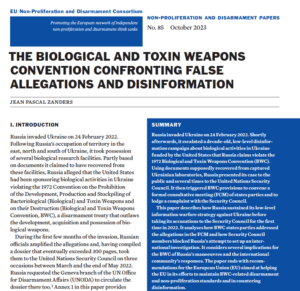The BTWC Confronting False Allegations And Disinformation
Introduction
Russia invaded Ukraine on 24 February 2022. Following Russia’s occupation of territory in the east, north and south of Ukraine, it took possession of several biological research facilities. Partly based on documents it claimed to have recovered from these facilities, Russia alleged that the United States had been sponsoring biological activities in Ukraine violating the 1972 Convention on the Prohibition of the Development, Production and Stockpiling of Bacteriological (Biological) and Toxin Weapons and on their Destruction (Biological and Toxin Weapons Convention, BWC), a disarmament treaty that outlaws the development, acquisition and possession of biological weapons.
 During the first few months of the invasion, Russian officials amplified the allegations and, having compiled a dossier that eventually exceeded 300 pages, took them to the United Nations Security Council on three occasions between March and the end of May 2022. Russia requested the Geneva branch of the UN Office for Disarmament Affairs (UNODA) to circulate the dossier there too. Annex 1 in this paper provides a chronology of selected events relating to Russia’s allegations of Ukrainian and US BWC violations up until April 2023. As the accusations gained little traction with the international community, Russia requested a formal consultative meeting (FCM) under Article V of the BWC. Having failed to persuade the BWC states parties of its case at the FCM in September 2022, Russia subsequently invoked Article VI, thereby taking its complaint to the UN Security Council. In November 2022 the Security Council rejected a Russian draft resolution calling for the council to set up a commission of inquiry to investigate the allegations. Two of the five permanent members voted in favour, three voted against and all non-permanent members abstained.
During the first few months of the invasion, Russian officials amplified the allegations and, having compiled a dossier that eventually exceeded 300 pages, took them to the United Nations Security Council on three occasions between March and the end of May 2022. Russia requested the Geneva branch of the UN Office for Disarmament Affairs (UNODA) to circulate the dossier there too. Annex 1 in this paper provides a chronology of selected events relating to Russia’s allegations of Ukrainian and US BWC violations up until April 2023. As the accusations gained little traction with the international community, Russia requested a formal consultative meeting (FCM) under Article V of the BWC. Having failed to persuade the BWC states parties of its case at the FCM in September 2022, Russia subsequently invoked Article VI, thereby taking its complaint to the UN Security Council. In November 2022 the Security Council rejected a Russian draft resolution calling for the council to set up a commission of inquiry to investigate the allegations. Two of the five permanent members voted in favour, three voted against and all non-permanent members abstained.
These manoeuvres ultimately negatively affected the ninth review conference of the BWC at the end of 2022 as Russia blocked the inclusion in the conference’s final document of language mentioning the FCM and the Security Council meeting and their respective outcomes. Consequently, the treaty received no formal review of its operation, and states parties barely managed to agree on the work programme for the period until the 10th review conference in 2027.
The sequence of events in 2022 has severe implications for the BWC. It has exposed serious inadequacies in the convention’s complaints procedures under Article V. This was only the second time in the BWC’s history that an FCM had been convened under the article. The procedures did not meaningfully contribute to resolving compliance concerns or the accusations against Ukraine and the USA. Russia’s invocation of Article VI was unprecedented. While the outcome before the Security Council was indisputable, the use of Article VI and how the council members voted produced some legal uncertainties. Perhaps the most significant challenges arising from the events in 2022 are how the BWC, and by extension other disarmament and arms control treaties, must deal with manifestly false allegations and disinformation. The process was made more complicated because Russia continued to raise new allegations and concerns, meaning that Ukraine and the USA could never adequately address the accusations against them.
This paper reviews Russia’s information warfare campaign surrounding biological weapon research in Ukraine since the late 2000s and how Russia escalated the accusations after its invasion of Ukraine in 2022. It traces how Russia, having presented its allegations several times to the Security Council, manoeuvred to bring the USA-funded biological research in Ukraine within the ambit of the BWC, leading to the triggering of Articles V and VI. The paper then analyses why Russia failed in its objectives. It reflects on how the BWC has stood up against disinformation and sustained false allegations and concludes with some recommendations for the European Union (EU) given its long-standing commitments to strengthening the norm against biological weapons and major financial support for treaty implementation worldwide.
The Biological And Toxin Weapons Convention Confronting False Allegations And Disinformation, NON-PROLIFERATION AND DISARMAMENT PAPERS, No. 85 (October 2023) (PDF)
